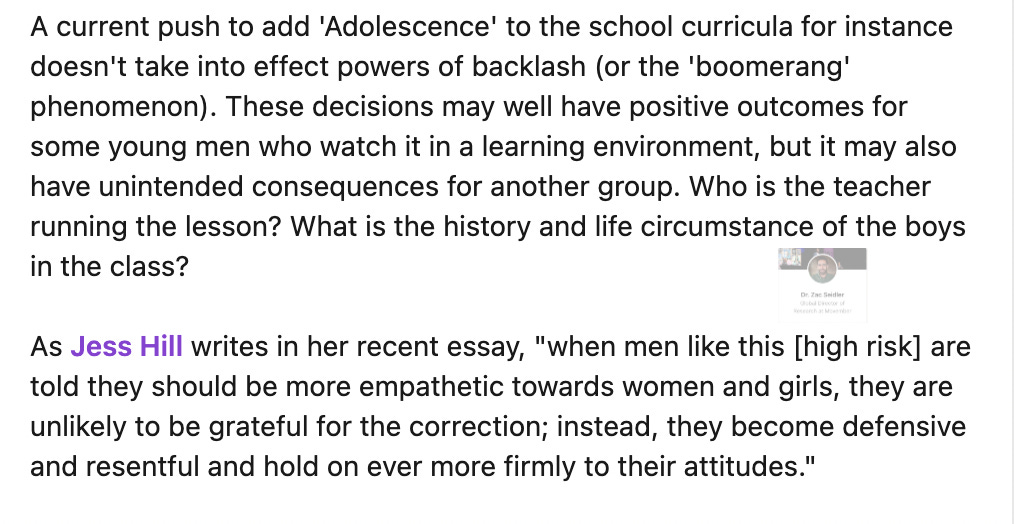Is Adolescence going to change how we think and talk about men’s mental health? Ever since the series came out, I have seen passion and energy in talking about the mental health of boys that had been missing for quite a while.
Belatedly, I watched the series two weeks ago, given my passion for improving the quality of conversation around boys’ mental health. Here is what I thought.
TL;DR: The series is well made. Each actor has done an amazing job in their role. You stay hooked till the last moment of the final episode. We should treat it as a well-made fictional series. We cannot let a show drive policy.
The Irony of Adolescence
There is a moment in episode 2 where the victim’s best friend is breaking down in front of her teacher. She is worried about being alone in a scary world. She is grieving the murder of her best friend. She is scared of being alone. The teacher she is opening up to simply says, “I will find you a therapist to talk to about this.”
The young girl obviously lashes out. She doesn’t want to talk to a therapist. She wants to talk to her teacher. She is vulnerable. She doesn’t want to be told, “Don’t tell me this, talk to a therapist.”
In response to the release of the series, the UK government has taken a lot of steps to tackle “toxic masculinity” in schools. This includes classes on empathy, gender sensitivity and screening the series in schools themselves. I see deep parallels between the two situations.
In both scenarios, you have young people who are speaking about their vulnerabilities, their fears and apprehensions of their role in the world. In both situations, you have adults more interested in finding quick solutions to the problem instead of engaging with the person right in front of them.
“Look at this series. This is not what you are supposed to do. Don’t be like this.”
“Don’t tell me this, let me get you a therapist to talk to.”
I can’t help but find this ironic. A series portraying how adolescents are consistently misunderstood by adults has adults misunderstanding teenagers in response.
As Dr. Zac Seidler, a leading researcher on men’s mental health, notes in his LinkedIn post, seemingly good ideas can have unintended negative consequences.
The Psychologist - Forensic or Therapy?
My colleagues were particularly impressed with the role of the psychologist in the series. Episode 3 focuses completely on the interaction between the psychologist and Jamie, the offender.
It helps to keep some things about the psychologist’s role in such circumstances. The psychologist was there in the capacity of a forensic psychologist. There seems to be some confusion about whether these sessions with Jamie were supposed to be therapy or interviews. The two are very different.
In an interview, the psychologist wants to ensure the accused is of sound mind, understands the consequences of their actions, and is capable of making rational choices. This information is then communicated in court to inform the judge’s verdict.
In therapy, the psychologist focuses more on healing and improving the mental state of the client, irrespective of whether the person is guilty or not.
In Adolescence, the roles seem to be interchangeable. At one point, the psychologist wants to “understand Jamie’s understanding of things”. At another, she seems to focus on testing Jamie’s ability to make sound choices.
From my perspective, this confusion about the psychologist’s role made her come off as confrontational. Conversations switch very quickly from fathers to masculinity to the internet to sexual urges.
I believe we should see her role as that of a forensic psychologist trying to assess Jamie’s mental capacities instead of someone trying to help him get better through therapy.
Incels and Andrew Tate
What surprised me the most in the series was that Jamie overtly tells the psychologist that he did NOT find Andrew Tate’s content engaging or sensible. The conversations online strongly suggested that, but that’s not the case.
The show portrays Jamie as a boy with no self-esteem. Someone who thinks he cannot be loved or appreciated, and someone who was being bullied in school and online. That is not what I had in mind while starting the show.
What made him kill a young girl with a knife? This is where the show enters the arena of fiction instead of being grounded in reality. Evidence consistently suggests that previous experience of violence within the family predicts a person’s chances of being violent in the future.
This doesn't mean someone with no exposure to violence cannot be violent, but it does mean it is improbable.
So what does this mean for our boys?
Are young boys being exposed to very extreme content online? They are.
Is it affecting their behaviour? We cannot be sure.
Research in media psychology has shown us that parenting and other proximal environmental influences are mediators of the relationship between media consumption and its effects on behaviours.
It would be unwise to create a moral panic around young boys based on the show itself. There are issues that our youth today are facing, especially boys, but a fictional series cannot be our basis for addressing these issues.
We need to be driven by research and evidence instead of rhetoric and hype.
We need to listen to those we are trying to help instead of imposing things on them.
If we want to help young boys, we need to co-create solutions with them.





